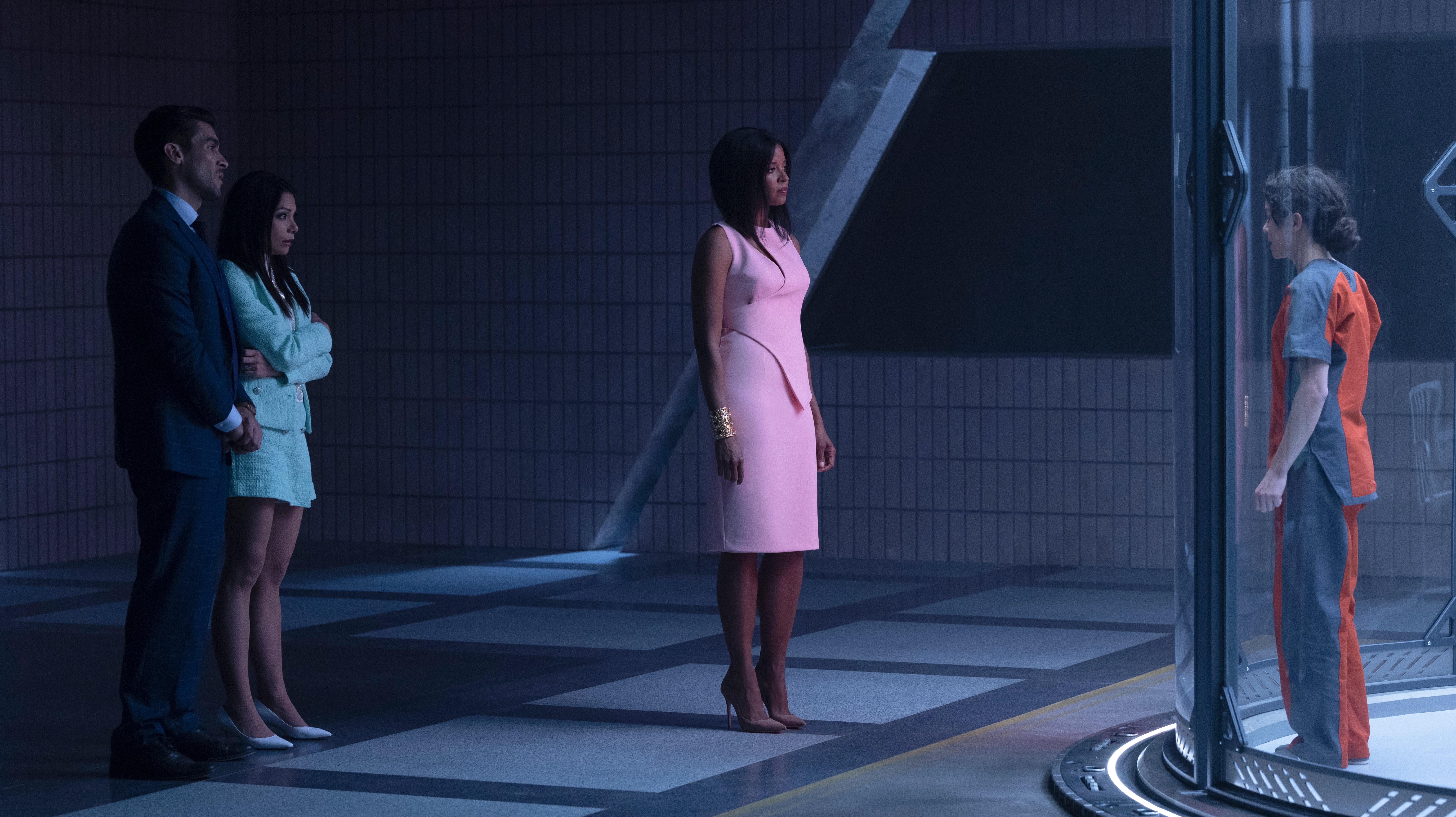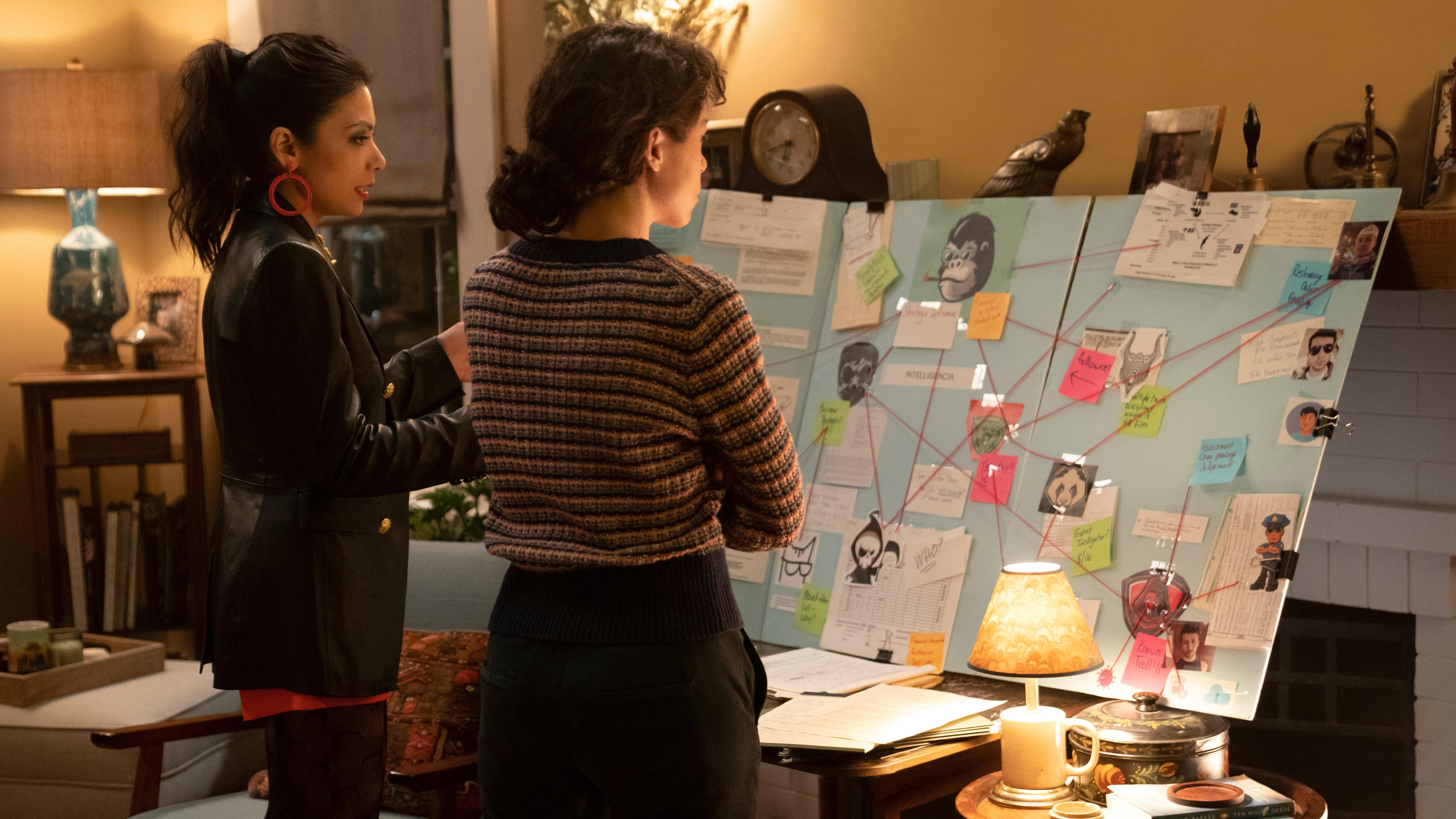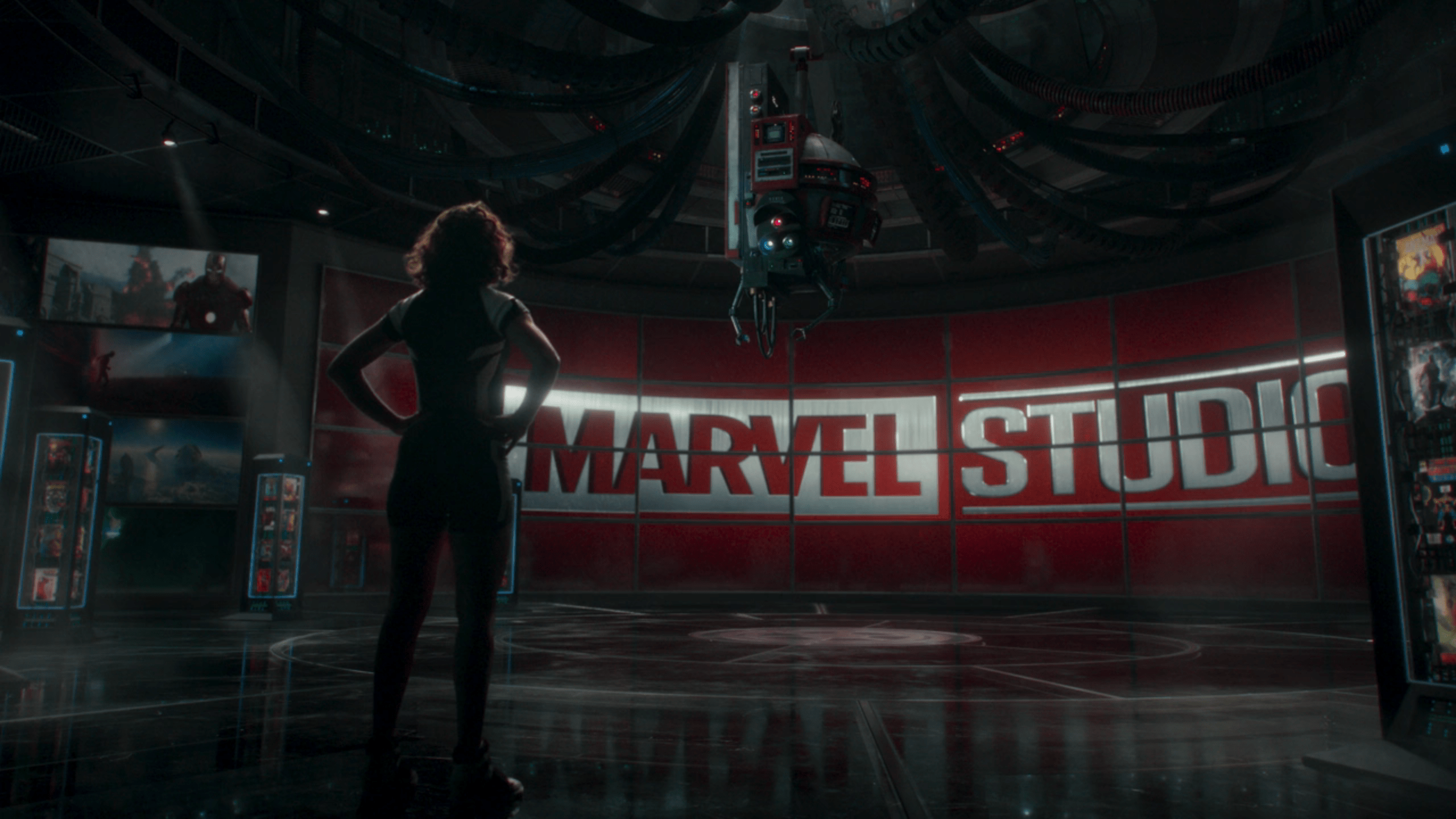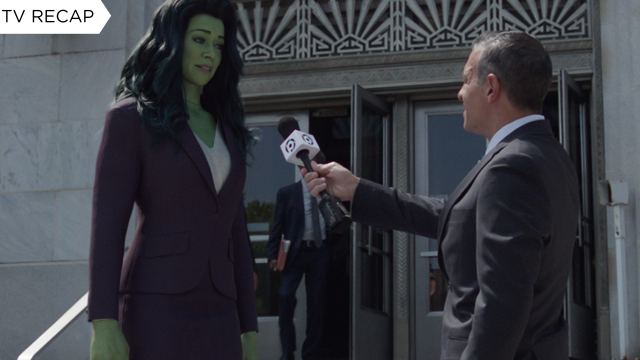“The latest Marvel movie/TV show/something or other just changed the Marvel universe forever!!!” is a sentiment you hear about practically every Marvel movie/TV show/something or other at this point. Game-changing potentiality drives scope and scale and pushes us onto the next thing, and the thing after that. She-Hulk joins its Marvel compatriots in doing so, but it comes at it with a suitably askew angle.
What if we broke the Marvel universe to give a woman the control over her own story?

“Whose Show Is This?” is a surprising end to She-Hulk’s debut season, and arguably perhaps, if the show were to somehow not continue, a fitting cap to a series that has prided itself in juking where the MCU’s output has typically jived, even at its most-marketing-approved “experimental.” The layers of metanarrative woven into its half-hour runtime threaten to pull down a series that has by and large avoided the MCU’s penchant for climactic excess, mostly by having its hero dive into that climactic excess and question just what it has to exist here, of all places. But it also champions a fundamental element of She-Hulk’s classic place in Marvel’s comics history — a hero of metatextual fourth-wall breaking that doesn’t just play with in-jokes a la Deadpool, but twists form and structure as well — in order to play a card so risky, it might have actually just changed She-Hulk forever in a way that goes simply beyond what it teases to come in the MCU.

From the get-go you know this finale is going to be peculiar when it opens with something teased in the very earliest footage we got of the show — a faux ‘70s style spin on She-Hulk akin to the classic Incredible Hulk TV show, all heavy grain film and kooky practical riffs on Jen’s green form. It’s the safe form of meta you’d expect: a little cheese, laughing at itself more than anything else, weird but not too weird, and all aesthetic. It’s the sort of aside you’d expect a show to throw at you to establish that it can be wacky, before getting into a run of the mill “serious” plot… which is exactly what She-Hulk does. The tone-shift is remarkable, as we begin dealing rapidly with the ramifications of Jen’s rage-out at the lawyer gala in the prior episode. We learn quickly that Jen has been jailed, that Intelligencia might get off the hook for its horrific invasion of her privacy, and as part of a plea deal arranged by GLK&H she not only loses her job and her apartment, but has been tagged with a bracelet that seemingly disables her power to transform permanently. Both She-Hulk and Attorney at Law, no more.
Down but not out as she moves back in with her parents, Jen rallies to try and uncover the trolls behind Intelligencia so she can do what she does best: sue the hell out of them for what they’ve done to her. It’s a play on a typical trope in superhero fiction — the powered become powerless — but it’s the kind of stakes that feel right for where She-Hulk has been all this season. There’s a fascinating glimpse of Jen’s everyday rage, the same kind of microagressions she talked about with Bruce all the way back in the very first episode, as she navigates her dwindling options. She’s mad, and she has the right to be, but that frustration can’t go anywhere — so she chooses to try and calm it out by returning to Emil Blonsky’s self-help retreat, now that their situations have become surprisingly parallel.

But this is where She-Hulk’s finale goes off the rails. While Jen goes to Blonsky’s retreat, Pug and Nikki tag-team to infiltrate an Intelligencia gathering held to celebrate She-Hulk’s downfall, where the duo quickly learn that Jen’s former one-date fling Todd is the mastermind behind the troll group, presumably for her having spurned his desires. Meanwhile, Jen’s attempts to find Blonsky at his own retreat lead her to discover that, gasp — the Intelligencia meeting is taking place at the retreat! And Emil has become Abomination again to give a seemingly very clueless motivational speech there! And Todd’s taken Jen’s blood so he can become Todd-Hulk! And Titania is here! And Bruce is here! Fight fight fight fight!
If all this sounds like a mess — and also like most Marvel third acts — it turns out that’s the point. Just as you begin to wonder if She-Hulk has gone the inevitable way of Marvel’s desire for interconnected scale instead of on the path it paved for itself this season, “Whose Show Is This?” reveals its real game-changer: Jen’s pissed. So pissed that she takes five from all the mania at the retreat, quite literally tapping out into the Disney+ menu, and hopping over — cutely, via Marvel’s Assembled, Disney’s catch-all-name for behind the scenes MCU docs — to our reality to give her writer’s room a piece of her mind. If the faux-Bixby opening was the cute meta-commentary, this is She-Hulk through and through, taking her fourth-wall-breaking tone from her classic comics and applying it beyond to-camera jokes and sly references, but properly twisting She-Hulk’s form and structure.
It works, even when things get even more peculiar and, in an attempt to meet with Marvel Studios head honcho “Kevin” — of course, Mr. Baseball Cap himself, Feige — Jen instead encounters the “real” architect of the MCU: K.E.V.I.N. (the Knowledge Enhancing Interconnectivity Nexus) a cold, autonomous intelligence that distils Marvel content down to its purest, most algorithmic form. There’s a bite here, but not enough of one, to see Marvel tell on itself this way, especially because by and large even if She-Hulk is willing to jab at the formulaic, high-stakes sameiness of the Marvel structure we’ve seen across decades of film and now TV shows, it’s also not really doing or saying anything about that formula other than it is bad for Jen’s story, specifically. She argues to K.E.V.I.N. that She-Hulk is a lawyer comedy first, and a Marvel series second, but doesn’t really argue that it’s kind of bad that the MCU is so vast and yet so unvaried at this point that revealing it’s all pieced together like it’s designed by a robot running on safe-playing algorithms feels like an obvious joke to make. Jen manages to convince K.E.V.I.N. to smash this expectation, but just this one: after all, she is a Hulk, and they get to smash. Not so much anyone else trapped in this cinematic universe cycle.

What is on one level a powerful, rare point of commentary in the MCU of a female hero getting to take the reigns of her own narrative and choose to seek happiness over those heroics is also a relatively empty one — instead of upending the system Jen has found herself in, she simply decides to use that system for her own individual gain. I’m not saying I expected She-Hulk to completely destroy the way the Marvel machine works going forward; it is, after all, a product of that machine. It was never going to, but in playing a card it can only ever really play once on this sort of scale, coming so close to that idea, acknowledging it, and then backing off, is not as clever or as biting as it thinks it is, and that’s kind of a shame.
What isn’t a shame is Jen’s terms to bring her story to a close. She gets justice against Todd — not physically as She-Hulk, but as Jen herself, promising to see him in court. She swipes Bruce, Titania, and Abomination off the board, condensing that messy plotline into one where Blonsky himself as to atone for his actions with Jen’s support as his counsel. And then, in a wonderful bit of self-service, Jen takes the MCU’s penchant to just erratically toss in another superhero every once in a while to have Daredevil literally fall out of the sky, so he can meet her family and have one more week of fun in LA — giving Jen not just a vital superheroic ally, but the honest, romantic connection she has been longing for.

Sure, there are acquiesces to the Marvel formula even here. Bruce shows up anyway to reveal that he’s been away on Sakaar to deal with his estranged son, Skaar, and back in Blonsky’s cell it’s revealed that Wong is breaking him out for reasons unknown, offering him a place at Kamar-Taj (and a cheeky joke about Wong’s sudden importance as a character capable of showing up anywhere in a Marvel product, at any time). Among the goodness of Jen’s happy ending, these feel like quiet admittances that for all it can poke against K.E.V.I.N.’s machine, even She-Hulk can ultimately never truly smash it. A paradoxical so close, and yet so far realisation that even at its most “kooky,” the MCU will always bend to some form of this story we’ve seen time and time again.
Whether She-Hulk will continue beyond this is hard to say right now, her future, hinted here jokingly by K.E.V.I.N., already destined for movie support before it is a second season of her own show. But for the admittedly slight stumbles it took to make its point here, if this was the end of She-Hulk: Attorney at Law as we know it, it is at least an end on its own terms — one that is thoroughly Jennifer Walters, and thoroughly She-Hulk too.
Want more Gizmodo news? Check out when to expect the latest Marvel and Star Wars releases, what’s next for the DC Universe on film and TV, and everything you need to know about House of the Dragon and Lord of the Rings: The Rings of Power.
